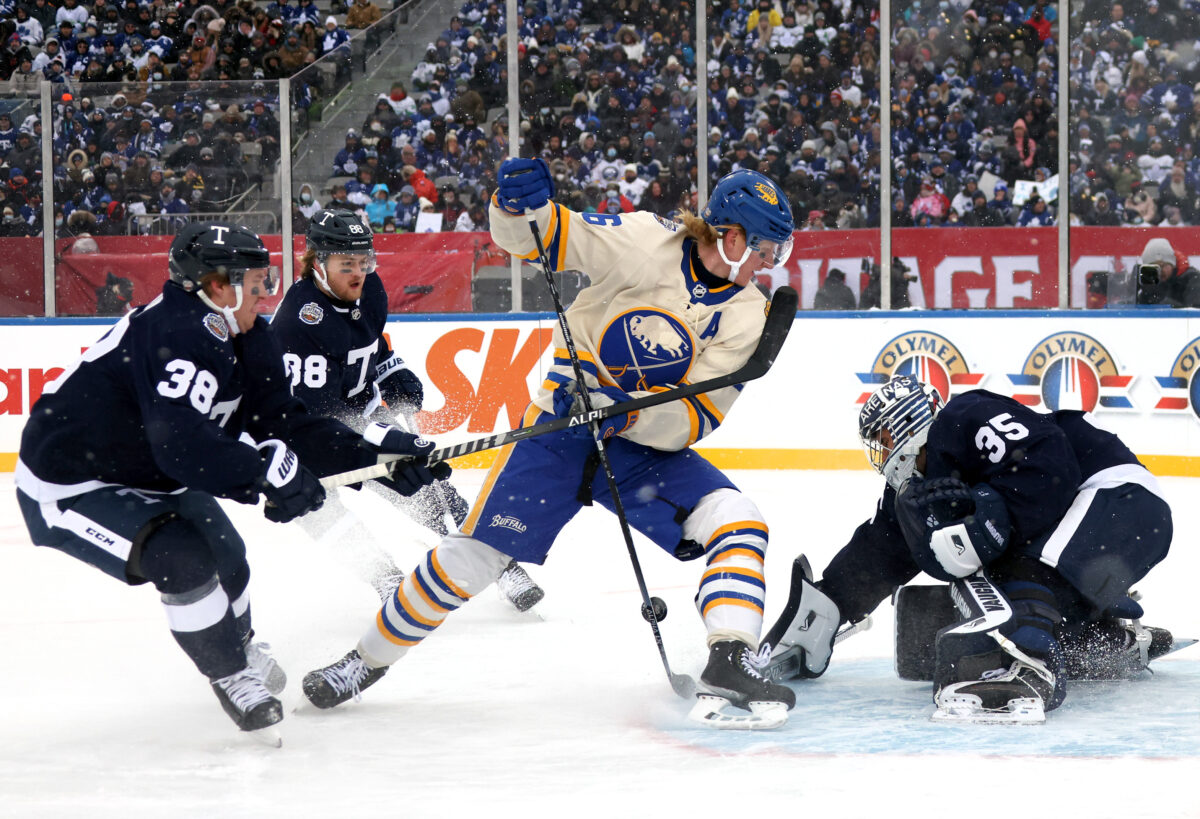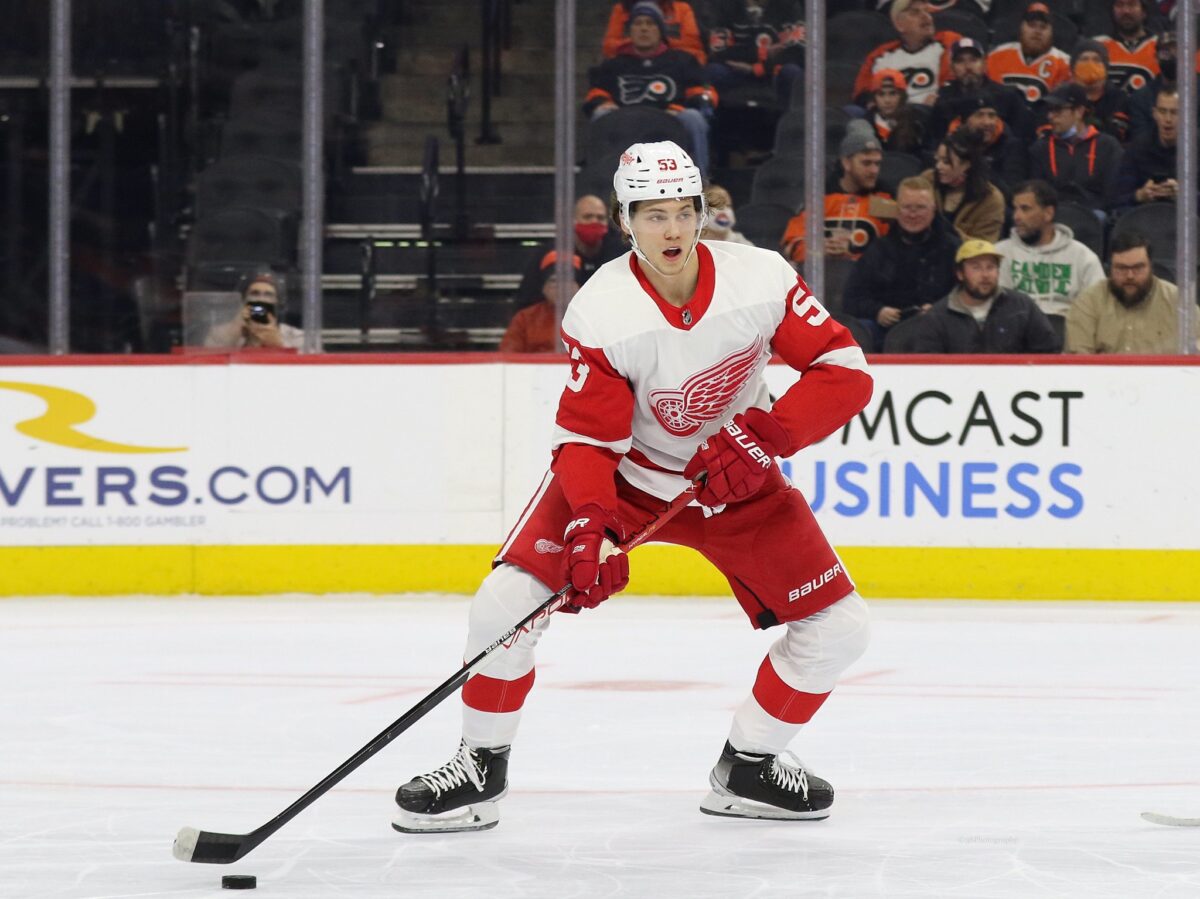The Buffalo Sabres have been mathematically eliminated from the playoffs for a couple of weeks, however, the Eastern Conference playoff picture has basically been set since early November, with four of the eight spots occupied by Atlantic Division teams. For the Sabres to end their 11-year playoff drought, interdivisional success will be imperative. They took some steps toward improving their divisional play with their improved play all around but their 8-13-4 record is uninspiring. So let’s take a tour around the Atlantic Division, examining how the Sabres performed this season against their divisional opponents, and how they can start having success moving forward.
Playoff Teams
Boston Bruins
Buffalo still has one game remaining against the Bruins on Thursday, but their abysmal outings against them are indicated by their 0-2-1 record. Boston’s top line of David Pastrnak, Patrice Bergeron and Brad Marchand has given them fits, with the trio combining for three goals and 11 points in their three games against them.
There is a reason for optimism though. In their first two matchups, the scores and play were lopsided in the Bruins’ favor with victories of 4-1 and 5-1. In their third meeting, things played out more evenly with the Bruins winning 4-3 in overtime. One of the differences in this game was the ability of Alex Tuch, Tage Thompson and Jeff Skinner to match up with the Bruins’ top line and produce offense in the process. Skinner and Tuch both scored, and Thompson chipped in two assists.
Next season the Bruins will likely be a playoff contender again, with or without the return of Bergeron. The Sabres should continue to lean on their top line to drive play against the Bruins while also relying on their young defenseman to shut down their offensive game. Combining that with what should be improved goaltending next season, the Sabres may be able to keep up with them next year.
Florida Panthers
There’s not really too much to say about the Sabres’ performance against the Panthers, the 0-4 record speaks for itself. As if four losses weren’t bad enough, they were outscored 22-11 in those four games and Florida dominated play for a majority of those games. From a glass-half-full perspective, the Panthers are beating up on almost every team in the NHL this season so the losses to them were somewhat expected.

The Panthers have an exceptional young core, and most of their players will be back next season regardless of their playoff performance. All the Sabres can really do is weather the storm and hope to keep up with them in terms of goal scoring. This team is going to be good for a while, so hopefully as Buffalo continues to develop they will be able to challenge the Panthers in the coming seasons.
Tampa Bay Lightning
A game that is probably forgotten by most Sabres fans at this point, but the Sabres blew out the Lightning 5-1 in their first matchup of the season. Things went downhill from there, with the Lightning securing victories of 6-1 and 5-0 in their last two matchups. Having a 1-2 record against the back-to-back Stanley Cup Champions is not something to be ashamed of, but the first game was probably more of an outlier than it was an indication of how well Buffalo matches up against Tampa Bay.
The Lightning are in the same situation as the Panthers, all you can do is weather the storm (no pun intended) against them. Tampa Bay has one of the best cores in the NHL and they will be a powerhouse in the league for the foreseeable future. As Buffalo progresses into a contender, the games against both Florida and Tampa Bay will grow more even in the coming years.
Toronto Maple Leafs
Finally, some good news! The Sabres have historically played well against the Maple Leafs, and this season was no different. They cruised to a 3-1 record against Toronto, with one of those wins coming on the outdoor stage at the Heritage Classic.

Led by Auston Matthews, the Maple Leafs are another example of how competitive the Atlantic Division is, and will continue to be moving forward. They have an exciting young group with Matthews, Mitch Marner, Morgan Reilly and William Nylander all performing at elite levels. This is perhaps the division rivalry that is most exciting for Sabres fans because of the success against Toronto and the nastiness that’s come with it. In the outdoor game, Rasmus Dahlin and Matthews got into a scrum, with Matthews ultimately being suspended for cross-checking Dahlin in the head. There is a clear dislike between the two teams, and that will continue in their contests next season.
Related: Sabres Beat Up on the Maple Leafs in 2021-2022
The NHL is a much better league when both the Sabres and Maple Leafs are good, and it’s been a while since they were both competitive at the same time. Even if Buffalo’s records against their other division opponents fail to improve, the Sabres will continue to play the Leafs tough.
When looking at how the Sabres ultimately stack up with the teams making the playoffs, there are some specific areas that stand out for improvement. These teams possess deep forward depth, giving them matchup advantages against some of the Sabres’ weaker lines. They have some intriguing forward prospects in their system that we should see soon to counter this, and they also have an abundance of cap space to add forward depth right now.
Secondly, these teams all have elite forwards on their team that can score at any moment in a game. Buffalo will need to add more NHL-level defensemen to shut down these players and add another goaltender to secure that position next season while allowing their younger goaltenders to further develop.
Non-Playoff Teams
When reviewing the Sabres’ performance against their non-playoff division rivals, the main factors to take into account are where these teams are in relation to contending, and how Buffalo performed against them this season.
Detroit Red Wings
The Sabres gave up more than three goals in all of their games against the Red Wings this season, and their record against them was 0-1-3. Overtime games tend to be toss-ups, and it’s hard to knock them for keeping the game close and getting a point in all of those games. Buffalo and Detroit haven’t played since mid-January, which is before the Sabres were playing as well as they have been since March.
Detroit is a very comparable team to Buffalo, both in the standings and roster makeup. Only three points separate these teams in the standings, and they are led by their young stars Dylan Larkin, Lucas Raymond and Moritz Seider. This mirrors players like Thompson, Tuch and Dahlin for the Sabres. Both teams have had inconsistent goaltending this season too, with both teams in the bottom 10 of goals against in the league.

The Red Wings will likely be on the same timeline as the Sabres in terms of their readiness to compete, making this matchup enticing to watch moving forward.
Montreal Canadiens
Buffalo went 3-1 against the Canadiens this season, scoring three or more goals in three of the games, but getting shut out in the other. Montreal has had a strange season, with their early-season struggles and then somewhat of a resurgence under new coach Martin St. Louis, and they are in somewhat of a transition period and could continue to struggle next season as they rebuild their team. This is something the Sabres will need to take advantage of in their matchups against them. Getting to the playoffs will mean winning games against inferior opponents, and if Montreal is not a competitive team next year it will be imperative to rack up wins against them.
Ottawa Senators
The Sabres went 1-2 in their games against the Senators this season. Ottawa, like Detroit, has a similar roster makeup and timeline for success that the Sabres do. They have young stars like Brady Tkachuk, Tim Stutzle and Thomas Chabot, with more on the way in their system. They are likely still a couple of years away from challenging for a playoff spot. The competitiveness will grow as each team grows, and we could see the former Senators-Sabres rivalry of the late 2000s being revived between the two as they develop into contenders again.
With the Atlantic Division being as competitive as it is, there will need to be patience as the Sabres transition away from being a perennial bottom-dweller to a playoff contender. Divisional games are difficult because of how often you play those teams, so it will be an adjustment period as they learn how to have success against the teams that have figured out how to win consistently.